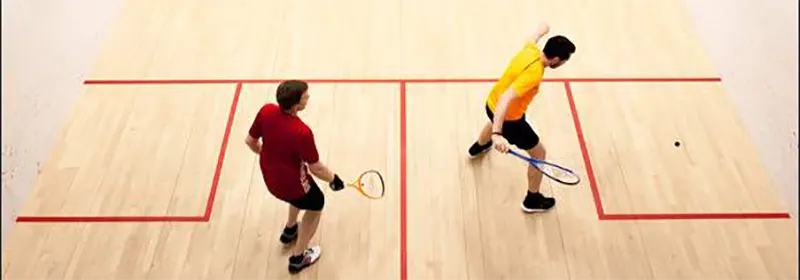08 July 2022 / x-Min Read / Translate
When you play squash against somebody, you are comparing your strengths and weaknesses against their strengths and weaknesses. But not just that, you are comparing those things “on the day”, meaning if you played the same person every day for a week, the result might be different. The closer you are in standard, the more likely the result will be different. If you play against somebody that you are either much better than or much worse than, then the result will be the same.
A tricky squash player is one whose strengths and weaknesses cause you the most problems. We like to think that “tricky” means playing unusual or deceptive shots, and that can be true, but it’s not the only valid definition. Tricky in this context simply means something that you find difficult to respond to. Older, more experienced squash players are often called tricky by their younger opponents because those older players know what works and what doesn’t work against many types of player.

Watch out for his tricky forehand!
Let me give you tell you a squash story. On Monday, you are feeling fresh after a nice relaxing weekend at the beach or garden. Your body has had time to recover from a hard previous week. You play your opponent, who by the way has a great working boast, and do quite well. Normally, you find it hard to reach those boasts, but now that you are fresh, those boasts are a little easier to reach. Your drops are a little bit better because you are in a slightly better position. Today, the problem of his boasts are diminished due to your freshness.
You agree to play again on Friday, but as I am sure you have guessed, by then you are tired compared to Monday, but because you did so well against your opponent’s boasts on Monday they decide to not play them so often. You might have thought that I was going to say that the opponent played them and you didn’t get them, and that could certainly have happened. However, in this case, your opponent decided to try something new. He instead decides to speed up the game by hitting the ball hard and low.
Having to reach down in a split second causes you problems. Partly because you are tired, but perhaps because you are taller than most squash players. Suddenly, your opponent is winning easily. You keep worrying that he is going to boast and might even be standing slightly further forward that normal in the hopes of recreating your success responding to his boasts, making his hard and low shots even harder because you have less time to reach them.
Sorry to have tricked you, but there is no secret. My squash story illustrates that there are so many variables to each game; the opponent, the day you play, the court, your emotions etc etc. Your objective is to find your opponent’s weaknesses and play against those, while at the same time trying to use your strengths to win points. Unfortunately, sometimes your strengths match against your opponent’s strengths negating them.
Imagine you have a great working boast, but your opponent has an even better counter drop. Your strength has now become a weakness. The “secret” is to realize this and stop playing your boast. That ability to change your game based on what is happening on that day against that opponent is the strength.
Jonah Barrington said that when he came off the court after the first game, whether he had won or lost, he at least had learned a lot about his opponent. I suppose his opponents could say the same, but can you? I hate to admit this, but when I used to play I was pretty stupid. I over-thought, over-analyzed and over-played. As much as I believe we need to be aware of what our opponent is doing well and badly, we should keep things simple.
Spend the first game trying different things against your opponent to see what wins you points. But don’t spend the rest of the match playing only those shots – save them for important points.